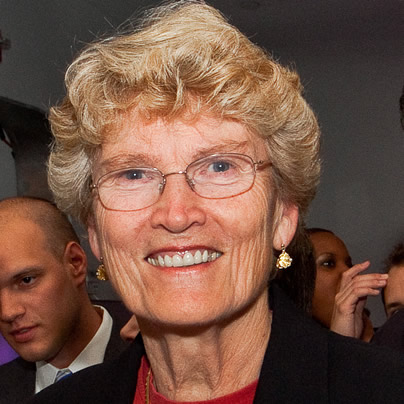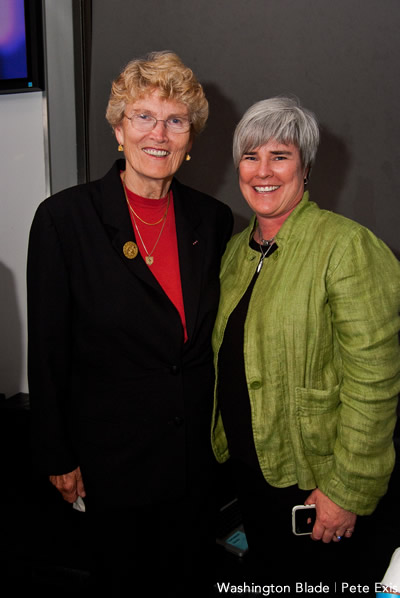National
Discharged service members among first to marry in Wash.
Cammermeyer planning to wed as new law takes effect


Grethe Cammermeyer (left) and Margaret Witt will be among the first to marry their partners in Washington State. (Blade file photo by Pete Exis)
A number of those who will be among the first to enter into same-sex marriages in Washington State are high-profile gay service members discharged for their sexual orientation who say the legalization of same-sex marriage represents the next step forward for LGBT rights.
In Washington, where voters legalized marriage equality on Election Day by a 54 percent majority via a measure known as Referendum 74, same-sex couples were set to be able to obtain marriage licenses on Thursday. The three-day waiting period in the state means gay couples that obtain licenses on that day will be able to legally marry beginning Sunday.
Washington is the first of three states — which includes Maine and Maryland — where voters legalized same-sex marriage at the ballot on Election Day to allow same-sex couples to obtain marriage licenses and legally wed.
Col. Grethe Cammermeyer, who in 1992 was discharged from the Washington National Guard under the military’s gay ban in the years before “Don’t Ask, Don’t Tell,” is set to marry her partner of 24 years, Diane Divelbess, in their Langley, Wash., home on Sunday after obtaining a marriage license from the clerk’s office in Island County.
For Cammermeyer, the ability to marry in Washington represents the next step in advancing LGBT rights following the repeal of “Don’t Ask, Don’t Tell” — and she said the repeal of the Defense of Marriage Act is in her sights. That ban on the federal recognition of same-sex partners precludes gay service members from obtaining health and pension benefits for their partners.
“I think, for me, it was a 20-year battle to overturn ‘Don’t Ask, Don’t Tell,'” Cammermeyer said. “That felt like a vindication of those who started to change the policy and was truly monumental for me on a personal level. What you realize is that once you get done with one hurdle, there is another one right ahead of you, and that now is marriage equality. Because until the Defense of Marriage Act is repealed, those serving in the military now who happen to be gay service members who have family still are treated as second-class citizens and their families have no standing.”
Cammermeyer, 70, and Divelbess, 77, said they’ve invited other same-sex couples into their home to marry on the same day and are expecting 10 couples to wed during their own individual ceremonies. It’ll be the third ceremony for Cammermeyer and Divelbess: the couple previously wed in Oregon in 2004, when marriage licenses were briefly offered to same-sex couples in Multnomah County for unions that were later nullified, and again in a religious ceremony in Washington State.
Divelbess said she’s already felt she’s like been married to Cammermeyer for years following their religious ceremony and expressed excitement that religious organizations that want to legally marry same-sex couples in Washington can now do so under the law.
“When we were married in 2004, all you heard was the voices of the churches that were unhappy with gay marriage,” Divelbess said. “The public was never aware of the churches who wanted their ceremony recognized as being legal by the state. I’m thrilled that now we’re going to have a legal status accepted as well as the spiritual commitment.”
Another couple planning to wed had a similar involvement in “Don’t Ask, Don’t Tell” repeal. Maj. Margaret Witt, an Air Force nurse who was discharged under “Don’t Ask, Don’t Tell” in 2007, and her partner of nine years, Laurie Johnson, intend to be the first same-sex couple to obtain a marriage license in Spokane. They’ll marry on Dec. 15 in a small ceremony officiated by James Lobsenz, Witt’s attorney from her ACLU case against “Don’t Ask, Don’t Tell” known as Witt v. Air Force.
Witt said the legalization of same-sex marriage in Washington State is “absolutely thrilling and surreal all at the same time,” but, like Cammermeyer, she said it demonstrates the battle for gay service members must continue and DOMA must be lifted from the books.
“The work is definitely not done because now we can serve our country openly, but the marriages still aren’t recognized by the military or the federal government,” Witt said. “That’s kind of painful for those that are willing to serve their country and have been willing to serve their country for so long.”
The Defense Department could offer limited partner benefits to gay service members even with DOMA on the books — including joint duty assignments, issuance of IDs, use of the commissary and family housing — through administrative change. The Pentagon has said since the lifting of “Don’t Ask, Don’t Tell” in September 2011 that it’s been looking into these benefits, but hasn’t yet enacted them.
The couple has been talking about marriage for years, but Witt took the opportunity to make things final during a speech at an ACLU dinner on Nov. 15 where she received a civil libertarian award. Following her speech at an ACLU dinner, the couples joined onstage amid applause and tears in the audience and Witt announced her proposal to Johnson.
Witt, 48, said she decided to propose to Johnson, 54, at the dinner in part because of the ACLU’s effort as part of the campaign to win marriage equality at the ballot in Washington.
“I just thought it was really perfect to share it with the ACLU, not only for what they did for me, but all that they did for marriage, and I wanted them to see that in real life,” Witt said.
‘An overwhelming sense of joy’
These military couples are among the estimated 19,000 same-sex couples who will be able to legally marry in Washington State amid anticipation an increased number of couples will flock to the clerk’s office when same-sex marriage becomes available in the state.
County auditors’ offices have updated their forms and their websites to prepare for these same-sex couples. On Thursday, King and Thurston counties were set to open at midnight, Pierce at 6:30 a.m. and Clark and Island counties at 8 a.m.
Anne Levinson, one of Washington’s first lesbian public officials and strategic adviser to the Approve Referendum 74 campaign, said she’s hearing from couples across the state that intend to marry and many of them have been waiting for the opportunity for decades.
“There is an overwhelming sense of excitement and joy, among the couples themselves, but also from friends, neighbors and colleagues,” Levinson said. “What makes it even more special is that we have seen an amazing outpouring of support all across the state, from county auditors working with us on how they will issue licenses, from judges and clergy helping make sure ceremonies are all set, from businesses offering to help however they can.”
A retired municipal judge, Levinson said on Sunday she intends to officiate some of the first weddings in Seattle on the stage of its grand concert hall as the Seattle Men’s Chorus and the Seattle Women’s Chorus perform.
Other same-sex couples that intend to be among the first to marry in California are noteworthy, but not for their participating in “Don’t Ask, Don’t Tell” repeal efforts.

Paul Harris (right) manages marriage licenses at the clerk’s office and is now able to receive one for him and his partner, Jamer Griener (photo courtesy Griener)
One such couple living in Camas, Wash., is James Griener, 58, and Paul Harris, 64, whose wedding is noteworthy because Harris is the manager of marriage license and recording for Clark County. After delivering marriage licenses to opposite-sex couples for 17 years, he’ll finally be able to obtain one of his own.
Harris said he’s surprised that same-sex marriage was legalized in Washington because marriage equality had been defeated previously in every state where it’s come up for a vote.
“To me, it’s a great surprise because I never thought it would happen,” Harris said. “Since I have been responsible for issuing marriage licenses for 17 years, it makes me feel great to be able to get one of my own.”
Griener and Harris were set to claim their marriage license on Thursday and were planning a small wedding in their home on Wednesday — 12/12/12.
The couple, who’ve been together for 39 years after in meeting in New York in 1973, has many differences between them. Harris was born and raised in Brooklyn, while Griener was raised in Southeast Oregon on a ranch.
Griener said the upcoming ceremony makes more permanent their union and builds off a previous wedding they had in Multnomah County in 2004 that was later nullified.
“We’re very pleased that the legislature of Washington passed same-gender marriage, the governor signed it and even though it was challenged and put on a referendum, the majority of Washington citizens voted in favor,” Griener said. “I think it’s a wonderful thing, and everyone knows, a long time coming.”
U.S. Supreme Court
Supreme Court to consider bans on trans athletes in school sports
27 states have passed laws limiting participation in athletics programs

The U.S. Supreme Court on Thursday agreed to hear two cases involving transgender youth challenging bans prohibiting them from participating in school sports.
In Little v. Hecox, plaintiffs represented by the ACLU, Legal Voice, and the law firm Cooley are challenging Idaho’s 2020 ban, which requires sex testing to adjudicate questions of an athlete’s eligibility.
The 9th U.S. Circuit Court of Appeals described the process in a 2023 decision halting the policy’s enforcement pending an outcome in the litigation. The “sex dispute verification process, whereby any individual can ‘dispute’ the sex of any female student athlete in the state of Idaho,” the court wrote, would “require her to undergo intrusive medical procedures to verify her sex, including gynecological exams.”
In West Virginia v. B.P.J., Lambda Legal, the ACLU, the ACLU of West Virginia, and Cooley are representing a trans middle school student challenging the Mountain State’s 2021 ban on trans athletes.
The plaintiff was participating in cross country when the law was passed, taking puberty blockers that would have significantly reduced the chances that she could have a physiological advantage over cisgender peers.
“Like any other educational program, school athletic programs should be accessible for everyone regardless of their sex or transgender status,” said Joshua Block, senior counsel for the ACLU’s LGBTQ and HIV Project. “Trans kids play sports for the same reasons their peers do — to learn perseverance, dedication, teamwork, and to simply have fun with their friends,” Block said.
He added, “Categorically excluding kids from school sports just because they are transgender will only make our schools less safe and more hurtful places for all youth. We believe the lower courts were right to block these discriminatory laws, and we will continue to defend the freedom of all kids to play.”
“Our client just wants to play sports with her friends and peers,” said Lambda Legal Senior Counsel Tara Borelli. “Everyone understands the value of participating in team athletics, for fitness, leadership, socialization, and myriad other benefits.”
Borelli continued, “The U.S. Court of Appeals for the Fourth Circuit last April issued a thoughtful and thorough ruling allowing B.P.J. to continue participating in track events. That well-reasoned decision should stand the test of time, and we stand ready to defend it.”
Shortly after taking control of both legislative chambers, Republican members of Congress tried — unsuccessfully — to pass a national ban like those now enforced in 27 states since 2020.
Federal Government
UPenn erases Lia Thomas’s records as part of settlement with White House
University agreed to ban trans women from women’s sports teams

In a settlement with the Trump-Vance administration announced on Tuesday, the University of Pennsylvania will ban transgender athletes from competing and erase swimming records set by transgender former student Lia Thomas.
The U.S. Department of Education’s Office for Civil Rights found the university in violation of Title IX, the federal rights law barring sex based discrimination in educational institutions, by “permitting males to compete in women’s intercollegiate athletics and to occupy women-only intimate facilities.”
The statement issued by University of Pennsylvania President J. Larry Jameson highlighted how the law’s interpretation was changed substantially under President Donald Trump’s second term.
“The Department of Education OCR investigated the participation of one transgender athlete on the women’s swimming team three years ago, during the 2021-2022 swim season,” he wrote. “At that time, Penn was in compliance with NCAA eligibility rules and Title IX as then interpreted.”
Jameson continued, “Penn has always followed — and continues to follow — Title IX and the applicable policy of the NCAA regarding transgender athletes. NCAA eligibility rules changed in February 2025 with Executive Orders 14168 and 14201 and Penn will continue to adhere to these new rules.”
Writing that “we acknowledge that some student-athletes were disadvantaged by these rules” in place while Thomas was allowed to compete, the university president added, “We recognize this and will apologize to those who experienced a competitive disadvantage or experienced anxiety because of the policies in effect at the time.”
“Today’s resolution agreement with UPenn is yet another example of the Trump effect in action,” Education Secretary Linda McMahon said in a statement. “Thanks to the leadership of President Trump, UPenn has agreed both to apologize for its past Title IX violations and to ensure that women’s sports are protected at the university for future generations of female athletes.”
Under former President Joe Biden, the department’s Office of Civil Rights sought to protect against anti-LGBTQ discrimination in education, bringing investigations and enforcement actions in cases where school officials might, for example, require trans students to use restrooms and facilities consistent with their birth sex or fail to respond to peer harassment over their gender identity.
Much of the legal reasoning behind the Biden-Harris administration’s positions extended from the 2020 U.S. Supreme Court case Bostock v. Clayton County, which found that sex-based discrimination includes that which is based on sexual orientation or gender identity under Title VII rules covering employment practices.
The Trump-Vance administration last week put the state of California on notice that its trans athlete policies were, or once were, in violation of Title IX, which comes amid the ongoing battle with Maine over the same issue.
New York
Two teens shot steps from Stonewall Inn after NYC Pride parade
One of the victims remains in critical condition

On Sunday night, following the annual NYC Pride March, two girls were shot in Sheridan Square, feet away from the historic Stonewall Inn.
According to an NYPD report, the two girls, aged 16 and 17, were shot around 10:15 p.m. as Pride festivities began to wind down. The 16-year-old was struck in the head and, according to police sources, is said to be in critical condition, while the 17-year-old was said to be in stable condition.
The Washington Blade confirmed with the NYPD the details from the police reports and learned no arrests had been made as of noon Monday.
The shooting took place in the Greenwich Village neighborhood of Manhattan, mere feet away from the most famous gay bar in the city — if not the world — the Stonewall Inn. Earlier that day, hundreds of thousands of people marched down Christopher Street to celebrate 55 years of LGBTQ people standing up for their rights.
In June 1969, after police raided the Stonewall Inn, members of the LGBTQ community pushed back, sparking what became known as the Stonewall riots. Over the course of two days, LGBTQ New Yorkers protested the discriminatory policing of queer spaces across the city and mobilized to speak out — and throw bottles if need be — at officers attempting to suppress their existence.
The following year, LGBTQ people returned to the Stonewall Inn and marched through the same streets where queer New Yorkers had been arrested, marking the first “Gay Pride March” in history and declaring that LGBTQ people were not going anywhere.
New York State Assemblywoman Deborah Glick, whose district includes Greenwich Village, took to social media to comment on the shooting.
“After decades of peaceful Pride celebrations — this year gun fire and two people shot near the Stonewall Inn is a reminder that gun violence is everywhere,” the lesbian lawmaker said on X. “Guns are a problem despite the NRA BS.”
-

 U.S. Supreme Court2 days ago
U.S. Supreme Court2 days agoSupreme Court to consider bans on trans athletes in school sports
-

 Out & About2 days ago
Out & About2 days agoCelebrate the Fourth of July the gay way!
-

 Virginia2 days ago
Virginia2 days agoVa. court allows conversion therapy despite law banning it
-

 New York5 days ago
New York5 days agoTwo teens shot steps from Stonewall Inn after NYC Pride parade












